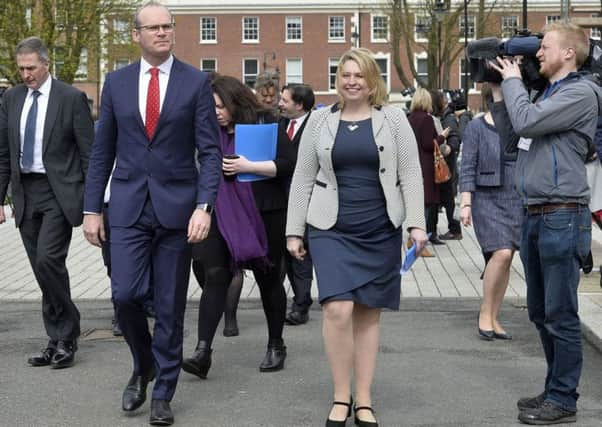Ben Lowry: Dublin is in no place to lecture UK if Brexit ‘no deal’ it has helped bring close actually happens


But arguably the more significant comments from the Taoiseach about ‘no deal’ were made earlier this week, when he said the UK and Ireland are obliged “to honour the Good Friday agreement” and “our commitment to the people of Ireland and Northern Ireland, that there won’t be a hard border”.
Dr Varadkar added: “We’d have to negotiate an agreement on customs and regulations that meant full alignment, so there will be no hard border.”
We would “have to” negotiate “full alignment”, he said.
Uh, no. We would not.
Advertisement
Hide AdAdvertisement
Hide AdIt would be welcome if once — just once — a UK minister slapped down a lecture from Dublin about what Britain “must do” .
Instead, for two years the government of a nation of 65 million people, the world’s sixth biggest economy, has stayed mute after scoldings by the government of a nation of five million people.
There was a time, in the run-up to the 2017 backstop, as Irish demands became clear, when influential Tories, from Lord Hague to Nick Timothy, publicly challenged them.
Dr Liam Fox, from within the government, did so too, saying Dublin was trying to get commitments on the border too early, before the shape of trade relations was clear.
Advertisement
Hide AdAdvertisement
Hide AdBut that criticism died away and Theresa May signed the backstop in December 2017, which largely acceded to Dublin’s demands, albeit with a paragraph inserted to rule out an Irish Sea border (abandoned by London late last year in its desperation to get a deal with the EU).
Even when Dr Varadkar showed EU leaders a picture of a 1972 IRA attack on a customs post, to highlight the security risk (ie terror threat), London was too polite to speak up.
It could have pointed out that the major European powers gave full moral support to the UK during the decades of IRA terror, while Ireland was the weak partner in that long effort to stop the bloodshed.
Britain is similarly reticent in Stormont talks. The UK is always neutral including, for example, when Simon Coveney backed Sinn Fein’s Irish language act demand.
Advertisement
Hide AdAdvertisement
Hide AdMr Coveney also said the detention of the dissident terrorist Tony Taylor was “contributing negatively to community tensions”. Taylor is the ex IRA man who abused the goodwill of his early release on licence under the Belfast Agreement, committing a later terror offence.
Did London dare to rebuke Mr Coveney implicitly by saying ministers would continue to make protection of life and property from terror a top priority? Of course not.
Last year some bullish unionists suggested the British Irish Intergovernmental Conference would not even be reactivated, but it was.
I thought a climbdown on the backstop was coming after hearing the emollient tones of David Lidington and Karen Bradley at the early November meeting. Within weeks Mrs May had indeed agreed what she said no UK prime minister could agree, an internal border.
Advertisement
Hide AdAdvertisement
Hide AdShe did try to make customs alignment UK-wide, to avoid tariffs in the Irish Sea, but while Great Britain might one day break free from EU on customs, the backstop Irish veto means Northern Ireland will probably never be allowed to do so.
This proved intolerable to MPs.
When Jeremy Corbyn cites the status of Northern Ireland in his opposition to the Withdrawal Agreement, and when right-wing Tories do the same, their opposition is also driven by factors that have nothing to do with NI. But the prospect of NI’s place in the UK being put in jeopardy by an arrangement that has unforeseeable long-term impact triggers genuine concern at Westminster as to the integrity of UK territory (a concern woefully absent in NI business leaders).
Dublin has played the uber Brussels loyalist. Last March I wondered on RTE if the EU might ditch Ireland as talks deadlines got close. It didn’t. Latterly on southern media I said Irish tactics had worked.
Irish commentators pointed out that the EU was always going to stand by a member state, as it did. Some UK observers noted that for the first time in centuries Ireland was more powerful than Britain because it had stuck by an EU that represents a much bigger population and economy than the UK.
Advertisement
Hide AdAdvertisement
Hide AdIf that is the end to the story, and Dublin’s gamble has paid off, then fair enough. But if not, they deserve little sympathy.
The full NI-Republic alignment Dr Varadkar says “must” happen will have significant implications for sovereignty. Agreeing to such might make pragmatic — albeit grim — sense, to get a good deal with the EU powerhouse. But it makes less sense if the EU and Dublin have made a deal impossible.
Many Irish voices mock a UK “fantasy” vision of future trade with countries much further away than the EU bloc on Britain’s doorstep.
Yet Ireland has done something similar. It has with almost slavish loyalty hitched itself to major European economies that are further away from Ireland, and of less relevance to it, than the big economy that is on its doorstep: the UK.
Advertisement
Hide AdAdvertisement
Hide AdIf no deal is the outcome, Britain might be best to ignore Dr Varadkar’s lectures as to what it must do.
• Ben Lowry (@BenLowry2) is News Letter deputy editor